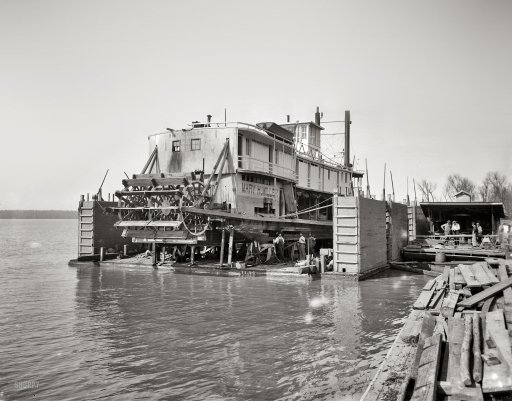
DPC Sternwheeler Mary H. Miller in Mississippi River floating dry dock, Vicksburg 1905

Sure. We believe you.
• China, US Commit To Refrain From Currency Wars (R.)
China and the United States on Sunday committed anew to refrain from competitive currency devaluations, and China said it would continue an orderly transition to a market-oriented exchange rate for the yuan. A joint “fact sheet”, issued a day after U.S. President Barack Obama and his Chinese counterpart Xi Jinping held talks, also said the two countries had committed “not to unnecessarily limit or prevent commercial sales opportunities for foreign suppliers of ICT (information and communications technology) products or services”. While China and the United States cooperate closely on a range of global issues, including North Korea’s disputed nuclear program and climate change, the two countries have deep disagreements in other areas, like cyberhacking and human rights.
Both countries said they would “refrain from competitive devaluations and not target exchange rates for competitive purposes”, the fact sheet said. Meanwhile, China would “continue an orderly transition to a market-determined exchange rate, enhancing two-way flexibility. China stresses that there is no basis for a sustained depreciation of the RMB (yuan). Both sides recognize the importance of clear policy communication.” China shocked global markets by devaluing the yuan in August 2015 and allowing it to slip sharply again early this year. Though it has stepped in to temper losses in recent weeks, the currency is still hovering near six-year lows against the dollar.

Only when Beijing can locate another bubble to blow.
• China’s $3.9 Trillion Wealth-Management Product Boom Seen Cooling (BBG)
China’s multi-trillion dollar boom in wealth-management products, under scrutiny around the world because of potential threats to financial stability, is set to cool as yields fall on tighter regulation, according to China Merchants Securities analyst Ma Kunpeng. Ma cited a “significant slowdown” in the products’ growth in the first half and said that WMPs may shrink in the future, with money flowing elsewhere. Banks have started to lower yields on WMPs in preparation for requirements for funds to be held in third-party custody, the analyst said, adding that such a change may be implemented over six months to a year. Currently, lenders can use newly invested money to pay off maturing products. The Chinese government and agencies including the IMF are focused on potential risks from WMPs that rose to a record 26.3 trillion yuan ($3.9 trillion) as of June 30.

Have investors, who are mostly domestic, buy your banks’ bad debt. This is just shifting the rotten fish from the right pocket to the left.
• China Banks Play Catch Up With Capital Raising As Bad Loans Soar (BBG)
China’s banks, which dialed down fundraising efforts this year even as bad debts swelled, are making up for lost time. Both lenders and the companies set up to acquire their delinquent assets are bolstering their finances. China Citic Bank last month announced plans to raise as much as 40 billion yuan ($6 billion), while Agricultural Bank of China, Industrial Bank and China Zheshang Bank are also boosting capital. China Cinda Asset Management and China Huarong Asset Management are poised to tap investors. “Chinese banks are preemptively raising capital while pricing remains favorable in order to tackle higher loan impairments,” said Nicholas Yap at Mitsubishi UFJ Securities in Hong Kong.
“Additionally, the mid- and small-sized lenders also need to boost their capital levels as they have been growing their asset bases rapidly, largely through their investment receivables portfolios.” Chinese banks have strained their finances with the busiest first-half lending spree on record, despite having the highest amount of bad debt in 11 years. Still, completed offerings of hybrid capital declined 38% after two consecutive years of record fundraising. A rule change in April that requires lenders to make full provisions for loan rights they have transferred is also encouraging the fundraising. BNP Paribas said Chinese lenders may be assessing the right time to approach investors.
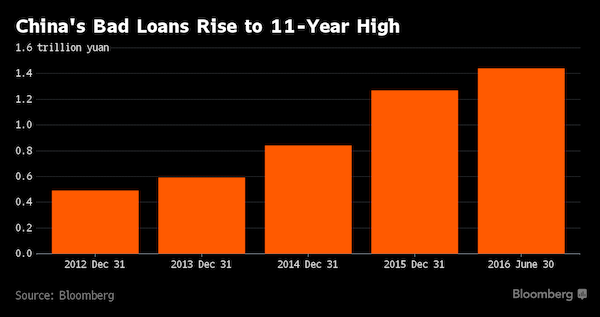

You have to specify who’s going to pay that cost, Joe.
• Stiglitz: “Cost Of Keeping Euro Probably Exceeds Cost Of Breaking It Up” (LSE)
Can the euro be saved? In an interview with Artemis Photiadou and EUROPP’s editor Stuart Brown, Nobel Prize-winning economist and bestselling author Joseph Stiglitz discusses the structural problems at the heart of the Eurozone, why an amicable divorce may be preferable to maintaining the single currency, and how European leaders should respond to the UK’s vote to leave the EU. Your new book, The Euro: And its Threat to Europe, outlines the problems at the heart of the euro and their effects on European economies. Can the euro be saved?
The fundamental thesis of the book is that it is the structure of the Eurozone itself, not the actions of individual countries, which is at the root of the problem. All countries make mistakes, but the real problem is the structure of the Eurozone. A lot of people say there were policy mistakes – and there have been a lot of policy mistakes – but even the best economic minds in the world would have been incapable of making the euro work. It’s fundamentally a structural problem with the Eurozone. So are there reforms that could make the euro work? Yes, I think there are and in my book I talk about what these reforms would be. They are not that complicated economically, after all the United States is made up of 50 diverse states and they all use the same currency so we know that you can make a currency union work. But the question is, is there political will and is there enough solidarity to make it work?
There is an argument that even if the euro was a mistake, the costs of breaking it up may be so severe that it is worth pushing for a reformed euro rather than pursuing what you call an ‘amicable divorce’. Are the benefits of a properly functioning euro worth the costs to get there? You are right. The question of whether you should form the union is different from whether you should break it up: history matters. I think it’s pretty clear now that it was a mistake to start the euro at that time, with those institutions. There will be a cost to breaking it up, but whichever way you look at it, over the last 8 years the euro has generated enormous costs for Europe. And I think that one could manage the cost of breaking it up and that under the current course, the cost of keeping the Eurozone together probably exceeds the cost of breaking it up.

Chapter 11.
• Hanjin Shipping Shares Drop 30% As It Seeks Stay Orders In 43 Countries (BBG)
South Korea’s financial regulator said Hanjin Shipping will seek stay orders in 43 countries to protect its vessels from being seized, after its court receivership filing last week roiled companies’ supply chain before the year-end shopping season. Applications in 10 countries will be made this week and the remainder soon, the Financial Supervisory Commission said in a statement Monday. Hanjin Group, owner of the shipping line, should also take more action to account for the “chaos” caused to the shipping industry, FSC Chairman Yim Jong Yong said. Vessels of Hanjin – the world’s 7th-largest container carrier with a 2.9% market share – are getting stranded at sea and ports after the box carrier sought protection, hurting the supply of LG televisions and other consumer goods ahead of the holiday season.
Hanjin Shipping shares resumed trading Monday limit down 30% and later erased losses to rally as much as 18%. Any optimism may be misplaced, said Park Moo Hyun Hana Financial Investment in Seoul. “Retail investors are hoping for the best on false hopes,” Park said. “They think that government measures to help resolve the supply-chain disruptions could mean it’s also supporting Hanjin Shipping. They don’t seem to realize that that’s the wrong conclusion.” The commission said 79 of Hanjin’s vessels, including 61 container ships, have had their operations disrupted. Hanjin Group Chairman Cho Yang Ho and Korean Air Lines, the shipping company’s largest shareholder, should take steps to ease the disruptions, Yim said.
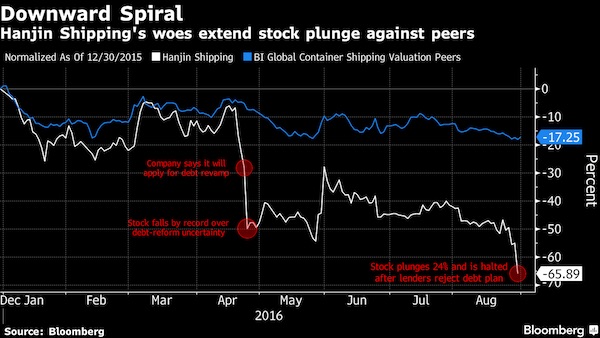

Keep digging!
• Japan’s Long-Term Bonds Add To Worst Rout Since 2013 (BBG)
Japanese long-term bonds fell, with 30-year debt adding to its biggest weekly loss in almost 2 1/2 years, as investors prepared to bid at an auction of the securities Tuesday. The rout is being driven by speculation the Bank of Japan will reduce its bond-buying program at its next policy meeting Sept. 20-21 now that it owns a third of the nation’s government debt. BOJ Governor Haruhiko Kuroda said Monday he doesn’t share the view there’s a limit to monetary easing. PIMCO said last month the central bank has pushed monetary policy as far as it can. “Unless Governor Kuroda directly rules out scaling back bond purchases, the market will continue to hold that as a possibility,” said Shuichi Ohsaki, the chief rates strategist at Bank of America’s Merrill Lynch unit in Tokyo. “Selling of longer-dated debt is likely ahead of tomorrow’s 30-year auction.”
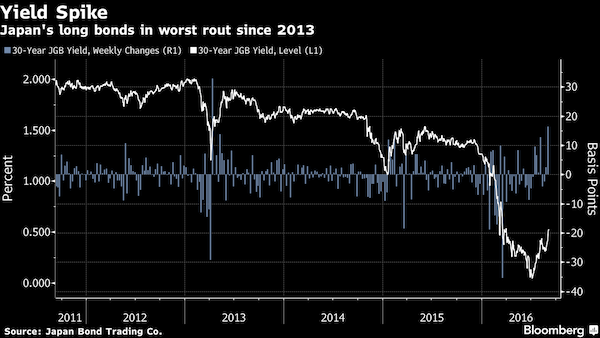

The whole notion that you’re going to try out ‘New Ideas’ kills off confidence, the one thing you know is needed.
• BOJ’s Kuroda Says Room For More Easing, Including New Ideas (R.)
Bank of Japan Governor Haruhiko Kuroda signaled his readiness to ease monetary policy further using existing or new tools, shrugging off growing market concerns that the bank is reaching its limits after an already massive stimulus program. He also stressed the BOJ’s comprehensive assessment of its policies later this month won’t lead to a withdrawal of easing. But Kuroda acknowledged that the BOJ’s negative interest rate policy may impair financial intermediation and hurt public confidence in Japan’s banking system, a sign the central bank is becoming more mindful of the rising cost of its stimulus.
“Even within the current framework, there is ample room for further monetary easing … and other new ideas should not be off the table,” Kuroda told a seminar on Monday. “There may be a situation where drastic measures are warranted even though they could entail costs,” he said, adding that the BOJ should “always prepare policy options.” Under its current framework that combines negative rates with hefty buying of government bonds and some riskier assets, the BOJ has gobbled up a third of Japan’s bond market and faced criticism from banks for squeezing already thin profit margins.

Slap that wrist!
• EU Finds Volkswagen Broke Consumer Laws In 20 Countries (R.)
The European Commission has found that Volkswagen broke consumer laws in 20 European Union countries by cheating on emissions tests, German daily Die Welt reported, citing Commission sources. Among them are the Consumer Sales and Guarantees Directive – which prohibits companies from touting exaggerated environmental claims in their sales pitches – and the Unfair Commercial Practises Directive, both of which apply across the EU, the paper said. The European Commission said Industry Commissioner Elzbieta Bienkowska has repeatedly invited Volkswagen to consider compensating consumers voluntarily, without an encouraging response, and that it was for national courts to determine whether consumers were legally entitled to compensation.
To ensure consumers are treated fairly, a Commission spokeswoman said, Consumer Commissioner Vera Jourova had written to consumer associations across the EU to collect information. “She will meet relevant representatives in Brussels this week,” the spokeswoman wrote in an emailed response. Jourova has been working with consumer groups to pressure Volkswagen to compensate clients in Europe as it has in the United States over the diesel emissions scandal. Volkswagen has pledged billions of euros to compensate owners of VW diesel-powered cars, but has so far rejected calls for similar payments for the 8.5 million affected vehicles in Europe, where different legal rules weaken the chances of winning a pay out.

Jim makes a good point: today’s food lines have turned digital.
• The Greater Depression (Quinn)
It’s the black and white photographs of disheartened men and hungry children from the 1930’s that define the Great Depression for present day generations. Of course after years of government run social engineering disguised as education, most people couldn’t even define when or what constituted the Great Depression. These heart wrenching portraits of average Americans suffering and in despair capture the zeitgeist of the last Fourth Turning crisis. Apologists for the status quo contend the last eight years couldn’t possibly be classified as a depression. The narrative of economic recovery has been peddled by corporate media mouthpieces, feckless politicians, Too Big To Trust Wall Street bankers, Federal Reserve puppets, and government apparatchiks flogging manipulated data as proof of economic advancement. They point to the lack of soup lines as proof we couldn’t be experiencing a depression.
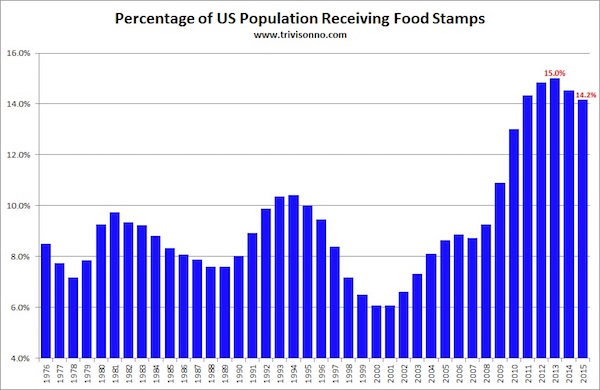
First of all, if there were soup lines, the corporate media would just ignore them. If they don’t report it, then it isn’t happening. Secondly, the soup lines are electronic, as the government downloads the “soup” onto EBT cards so JP Morgan can reap billions in fees to run the SNAP program. Just because there are no pictures of starving downtrodden Americans in shabby clothes waiting in soup lines, doesn’t mean the majority of Americans aren’t experiencing a depression. If the country has actually been experiencing an economic recovery for the last seven years, why would 14% to 15% of all Americans be dependent on food stamps to survive? When the economy is actually growing and employment is really below 5%, the%age of Americans on food stamps is below 8%.
If the government economic data was truthful, there would not be 43.5 million people living in 21.4 households (17% of all households) dependent on food stamps. More than 100 million Americans are now dependent on some form of federal welfare (not including Social Security or Medicare). If the economy came out of recession in the second half of 2009, why would 6 million more Americans need to go on welfare over the next two years?

I don’t know, it’s an ambitious dream and all, but… Reading that $40 billion has been pledged for a $1.4 trillion project doesn’t help, I guess.
• The Ultimate 21st Century Choice: OBOR Or War (Escobar)
The G20 meets in tech hub Hangzhou, China, at an extremely tense geopolitical juncture. China has invested immense political/economic capital to prepare this summit. The debates will revolve around the main theme of seeking solutions “towards an innovative, invigorated, interconnected and inclusive world economy.” G20 Trade Ministers have already agreed to lay down nine core principles for global investment. At the summit, China will keep pressing for emerging markets to have a bigger say in the Bretton Woods system. But most of all China will seek greater G20 backing for the New Silk Roads – or One Belt, One Road (OBOR), as they are officially known – as well as the new Asian Infrastructure Investment Bank (AIIB).
So at the heart of the G20 we will have the two projects which are competing head on to geopolitically shape the young 21st century. China has proposed OBOR; a pan-Eurasian connectivity spectacular designed to configure a hypermarket at least 10 times the size of the US market within the next two decades. The US hyperpower – not the Atlanticist West, because Europe is mired in fear and stagnation — “proposes” the current neocon/neoliberalcon status quo; the usual Divide and Rule tactics; and the primacy of fear, enshrined in the Pentagon array of “threats” that must be fought, from Russia and China to Iran. The geopolitical rumble in the background high-tech jungle is all about the “containment” of top G20 members Russia and China.
Shuttling between the West and Asia, one can glimpse, in myriad forms, the graphic contrast between paralysis and paranoia and an immensely ambitious $1.4 trillion project potentially touching 64 nations, no less than 4.4 billion people and around 40 per cent of the global economy which will, among other features, create new “innovative, invigorated, interconnected and inclusive” trade horizons and arguably install a post-geopolitics win-win era. An array of financial mechanisms is already in place. The AIIB (which will fund way beyond the initial commitment of $100 billion); the Silk Road Fund ($40 billion already committed); the BRICS’s New Development Bank (NDB), initially committing $100 billion; plus assorted players such as the China Development Bank and the Hong Kong-based China Merchants Holdings International.
Chinese state companies and funds are relentlessly buying up ports and tech companies in Western Europe – from Greece to the UK. Cargo trains are now plying the route from Zhejiang to Tehran in 14 days, through Kazakhstan and Turkmenistan; soon this will be all part of a trans-Eurasia high-speed rail network, including a high-speed Transiberian. The $46 billion China-Pakistan Economic Corridor (CPEC) has the potential to unblock vast swathes of South Asia, with Gwadar, operated by China Overseas Port Holdings, slated to become a key naval hub of the New Silk Roads. Deep-sea ports will be built in Kyaukphyu in Myanmar, Sonadia island in Bangladesh, Hambantota in Sri Lanka. Add to them the China-Belarus Industrial Park and 33 deals in Kazakhstan covering everything from mining and engineering to oil and gas.

Greece gets punished for not inflicting more misery on its people fast enough.
• EU Will Not Release More Bailout Money For Greece This Month (R.)
The euro zone will not release additional bailout money for Greece at a meeting in Bratislava this month, Germany’s Handelsblatt Global reported on Sunday, citing European Union diplomats. The online edition of the German business daily quoted the diplomats as saying that Athens had only implemented two of 15 political reforms that are conditions for the bailout money. Above all, they said, Greece had been slow to privatize state assets. Under a deal signed last year with the Troika, the ESM will provide financial assistance of up to €86 billion to Greece by 2018 in return for the agreed reforms.
The debt relief is due to be granted in tranches, including short-term measures to extend Greece’s debt, with a further reduction due after 2018 including interest deferrals and interest rate caps. Handelsblatt Global said the Eurogroup had approved a tranche of €10.3 billion for Greece in May from the overall package. An initial €7.5 billion of that sum had been transferred to Athens with the rest scheduled to arrive in the fall. The diplomats said the Eurogroup will only discuss a progress report on Greece at the Bratislava meeting. The comments came just days after the head of the euro zone’s bailout fund, the European Stability Mechanism (ESM) on Saturday said Greece could secure short-term debt relief measures “very soon” if it implements remaining reforms agreed under its bailout program.

Civilized Europe.
• Hungary Police Recruit ‘Border-Hunters’ To Keep Migrants Out (BBC)
The Hungarian police are advertising for 3,000 “border-hunters”, who will reinforce up to 10,000 police and soldiers patrolling a razor-wire fence built to keep migrants out. The new recruits, like existing officers, will carry pistols with live ammunition, and have pepper spray, batons, handcuffs and protective kit. The number of migrants reaching Hungary’s southern border with Serbia has stagnated, at fewer than 200 daily. The new guards will start work in May.\ The recruits will have six months’ training, they must be over 18, physically fit and must pass a psychological test, police officer Zsolt Pozsgai told Hungarian state television. Monthly pay will be 150,000 forint ($542) for the first two months, then 220,300 forint.
Hungary is in the grip of a massive publicity campaign, launched by Prime Minister Viktor Orban’s right-wing government ahead of a 2 October referendum. Voters will be asked to oppose a European Commission proposal to relocate 160,000 refugees more fairly across the 28-nation EU. Under the EU scheme, Hungary has been asked to take 1,300 refugees. The relocation programme is for refugees from Syria, Iraq and Eritrea. Currently 30 migrants are allowed into Hungary each day through official “transit zones”.

Inevitable when far too many people are forced into far too few places, over prolonged periods of absolute uncertainty about their fate. Though children assaulting children is a new depth. Our friend Kostas says these things originate almost always in a lack of food. The solution is simple: EU countries should live up to their promises regarding refugee relocation.
• Overnight Clashes At Lesvos Refugee Center (Kath.)
Authorities say clashes have broken out between rival ethnic groups of refugees and other migrants at a detention camp on the eastern Aegean Sea island of Lesvos. The trouble at the Moria hot spot started shortly after midnight in a wing of the camp where minors are held and then spread, authorities said, adding that child refugees from Syria had been assaulted by a group of Afghan children. An unspecified number of children were injured while about 40 of them escaped into nearby fields. Order was restored around 4 a.m. after intervention by riot police. Authorities were trying to locate the missing children. Nearly 5,000 migrants and refugees are currently sheltered on the islands of Lesvos. Local authorities are demanding immediate government action to decongest overcrowded migrant facilities.

Australia’s ancient civilizations were way ahead of anyone else.
• 9,000-Year-Old Stone Houses Found On Australian Island (G.)
Archeologists working on the Dampier archipelago off Australia’s north-west coast have found evidence of stone houses dating back 9,000 years – to the end of the last ice age – building the case for the area to get a world heritage listing. Circular stone foundations were discovered in a cave floor on Rosemary Island, the outermost of 42 islands that make up the archipelago. The islands and the nearby Burrup peninsula are known as Murujuga – a word meaning “hip bones sticking out” – in the language of the Ngarluma people. Prof Jo Mcdonald, director of the Centre for Rock Art Research and Management at the University of Western Australia, said the excavations showed occupation was maintained throughout the ice age and the period of rapid sea level rise that followed.
“Around 8,000 years ago, it would have been on the coast,” McDonald told Guardian Australia. “This is the time that the islands were starting to be cut off and it’s a time when people were starting to rearrange themselves.” The sea level on Australia’s north-west coast rose 130 metres after the end of the ice age, at a rate of about a metre every five to 10 years. “In people’s lifetimes they would have seen loss of territory and would have had to renegotiate – a bit like Miami these days,” McDonald said. The placement of the stone structures indicated how that sudden space restriction was managed, she said. “The development of housing is really significant in terms of understanding how people actually divided up their space and lived in close proximity to each other in times of environmental stress.”

“..we are wiping out some of our closest relatives..”
• World’s Largest Gorillas ‘One Step From Going Extinct’ (AFP)
The world’s largest gorillas have been pushed to the brink of extinction by a surge of illegal hunting in the Democratic Republic of Congo, and are now critically endangered, officials said Sunday. With just 5,000 Eastern gorillas (Gorilla beringei) left on Earth, the majestic species now faces the risk of disappearing completely, officials said at the International Union for Conservation of Nature’s global conference in Honolulu. Four out of six of the Earth’s great apes are now critically endangered, “only one step away from going extinct,” including the Eastern Gorilla, Western Gorilla, Bornean Orangutan and Sumatran Orangutan, said the IUCN in an update to its Red List, the world’s most comprehensive inventory of plant and animal species. Chimpanzees and bonobos are listed as endangered.
“Today is a sad day because the IUCN Red List shows we are wiping out some of our closest relatives,” Inger Andersen, IUCN director general, told reporters. War, hunting and loss of land to refugees in the past 20 years have led to a “devastating population decline of more than 70%,” for the Eastern gorilla, said the IUCN’s update. One of the two subspecies of Eastern gorilla, known as Grauer’s gorilla (G. b. graueri), has drastically declined since 1994 when there were 16,900 individuals, to just 3,800 in 2015. Even though killing these apes is against the law, hunting is their greatest threat, experts said. The second subspecies of Eastern gorilla – the Mountain gorilla (G. b. beringei) – has seen a small rebound in its numbers, and totals around 880 individuals.









Home › Forums › Debt Rattle September 5 2016